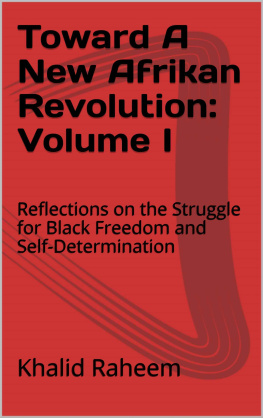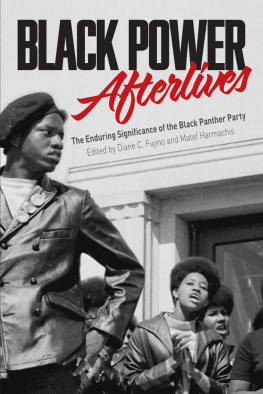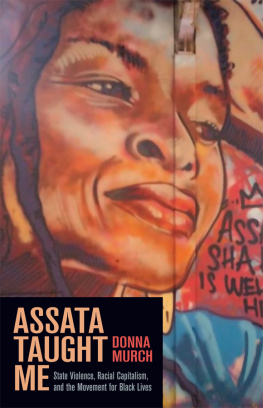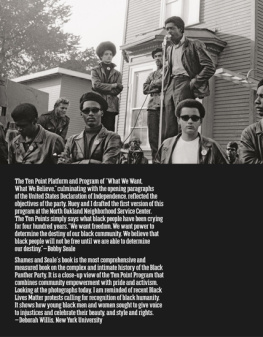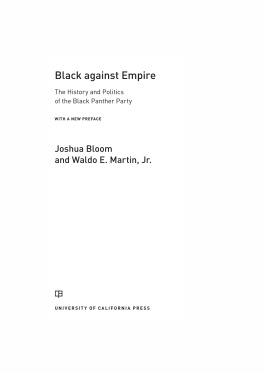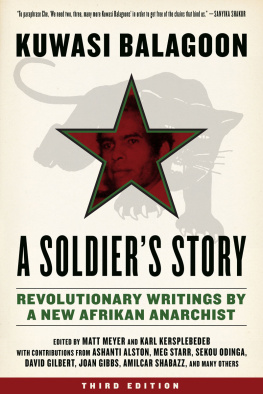
|
Toward A New Afrikan Revolution: Volume I |
Reflections on the Struggle for Black Freedom and Self-Determination |
Khalid Raheem |
This book represents a collection of my thoughts and ideas, new and previously shared, regarding some of the challenges facing the current effort and work to obtain freedom and liberation for Black people within the United States. It is not meant nor intended to be an academic study, but rather a series of observations, experiences and interpretations. I encourage readers to engage in debate, serious research and discourse concerning the many comments presented. I look forward to constructive criticism and feedback. The first chapter deals with definitions and how they can either help us in getting things done or keep us spinning in endless circles. Chapter 2 shares perspective about independent politics. In Chapter 3, I present critical commentary concerning the Black Lives Matter network and movement. In Chapter 4, I discuss some of the limitations imposed by certain ideologies which have been popular among Black activists. Chapter 5 is a reflection on the Black Panther Party. Chapter 6 takes on the role of Black military and police. Chapter 7 provides suggestions for further developing and strengthening the movement. And, finally Chapter 8 presents a series of select writings between the years 2014 and 2017. |
ABSTRACT:
Toward A New Afrikan Revolution: Volume I
Reflections on the Struggle for
Black Freedom
And
Self-Determination
BY
KHALID RAHEEM
FOREWORD:
A few years ago, as part of the ongoing political education initiative of the New Afrikan Independence Party (NAIP), I developed a pamphlet titled The Philosophy and Platform of the New Afrikan Independence Party. This pamphlet continues to serve as an introduction to and basic explanation of the Partys focus and platform.
This is actually my first foray into writing any sort of book, in this instance, a collection of my thoughts regarding various aspects of the ongoing struggle for Black liberation and freedom.
Our communities face a host of serious challenges today that are indeed very similar to those faced by the generations of the middle-to-late twentieth century: white-supremacy, racism, mass-incarceration, police violence and misconduct, wealth-disparity, sexism and income inequality.
We are also living during a period of serious conflict and contradiction among elements of the ruling-class elite of the United States and even among some of their main allies abroad. Capitalism is in crisis. Neo-liberalism is proving to be unable and unwilling to fulfill its promise. White nationalism and authoritarianism have gained political ground throughout the United States, Europe and certain parts of Latin America.
This edition of Toward A New Afrikan Revolution is an attempt to offer some perspective and perhaps some sense of direction for all of those who are impacted by the reality of being Black in America and those of us who identify ourselves as activist, radicals, revolutionaries and people of conscience.
I want to thank the Supporters, Brothers, Sisters and Comrades of the New Afrikan Independence Party for their dedication, inspiration, patience and hard-work in advancing Black freedom and self-determination. To learn more about the New Afrikan Independence Party, visit us at www.newafrikan.org . You can also find us on Facebook and Twitter.
All Power to the People!
Free the Land!
Free All Political Prisoners!
Khalid Raheem
March 19, 2019
TABLE OF CONTENTS:
- Definitions Shape Our Perspective1
- Why an Independent Black Political Party31
- Black Lives Matter (BLM) is NOT the Black Liberation Movement (BLM)39
- The Limitations of Black Nationalism, Cultural Nationalism and Pan-Afrikanism..46
- Theory and Practice: Continuing the Legacy of the Black Panther Party..68
- Black Soldiers and Black Police: Serve The People or Defend The Empire78
- Building the Movement for Freedom and Self-Determination.85
- Selected Writings: (2014-2017).88
CHAPTER 1
Definitions Shape Our Perspective:
I may as well start here. I have witnessed and participated in numerous debates, discussions and arguments that basically boiled down to conflicting definitions of words, terminology and concepts. How we define our situation and circumstance does indeed shape our perspective and most importantly, influence and determine our response.
To illustrate, an increasing number of Black folks define themselves and others as conscious and woke . Some are self-described activist and radicals: while others are labeled as revolutionaries. What do these definitions really mean and how can such clarity help to advance our liberation movement in a practical way?
For example, who and what is the Black Conscious Community ? How are they defined and what are the requirements for inclusion?
Some folks self-identify as members based on their spiritual beliefs, religious or non-religious beliefs, their diet, personal life-styles: others define themselves according to what videos they have watched, books they have read or workshops attended.
Still, another group cites adherence to certain political philosophies such as Black Nationalism, Pan-Africanism, Cultural Nationalism, Feminism and/or variations of socialist ideology.
In essence, we have a mixture of Black nationalists, Pan-Afrikanists, Kemetics, New Afrikans, atheists, socialists, capitalists, small business owners and entrepreneurs: academics, democrats, republicans, independents, Yoruba, Christians, Hebrews, Moors, Muslims: vegans of differing types and folks of various sexual orientation (LGBTQ) who all lay claim to be members of the Black Conscious Community .
As such, many serve as self-appointed, or in some instances, duly selected representatives of Black thought, culture and politics.
Many unfamiliar with the various tendencies and nuanced differences between these groups would probably conclude that the Black conscious community was an amorphous unconscious mess.
On and off social media, the conscious community spends an inordinate amount of time and energy attacking and critiquing its members. The vast majority of this criticism is not grounded in principled ideological differences or questions of strategy and tactic.
Most criticism takes on the character of personality conflicts and cultural wars, similar to those waged among and between elements of the ruling-class political parties (democrats, republicans). Many of these cultural wars center on the following issues (in no particular order of importance):
- Black male and female relationships
- Religion versus Spirituality
- Ancient Kemet versus Africa/Afrika
- Black LGBTQ people
- How to deal with non-Black people (especially, but not exclusively white-people)
- Feminism
- Black Celebrity Culture
- Black Nationalist identity versus Class interest (Field Negro versus House Negro)
Additionally, these cultural wars and personality conflicts have created a specialized market for various Black cultural lecturers and their supporters. The fee-for-knowledge circuit has expanded their base of supporters.

